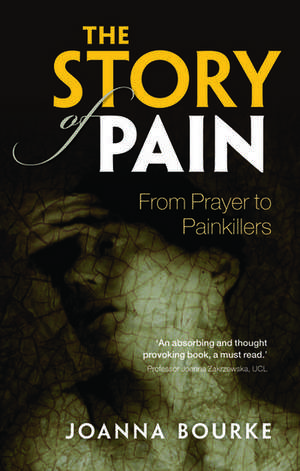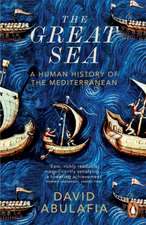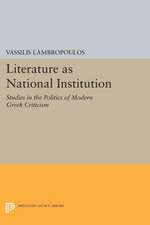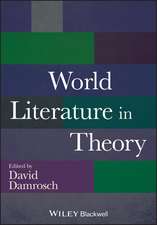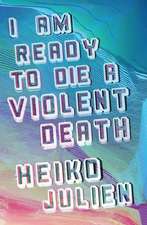The Story of Pain: From Prayer to Painkillers
Autor Joanna Bourkeen Limba Engleză Paperback – 9 feb 2017
| Toate formatele și edițiile | Preț | Express |
|---|---|---|
| Paperback (1) | 73.47 lei 31-37 zile | +32.11 lei 6-12 zile |
| OUP OXFORD – 9 feb 2017 | 73.47 lei 31-37 zile | +32.11 lei 6-12 zile |
| Hardback (1) | 127.81 lei 31-37 zile | |
| Oxford University Press – 26 iun 2014 | 127.81 lei 31-37 zile |
Preț: 73.47 lei
Preț vechi: 84.99 lei
-14% Nou
Puncte Express: 110
Preț estimativ în valută:
14.06€ • 15.28$ • 11.82£
14.06€ • 15.28$ • 11.82£
Carte tipărită la comandă
Livrare economică 09-15 aprilie
Livrare express 15-21 martie pentru 42.10 lei
Preluare comenzi: 021 569.72.76
Specificații
ISBN-13: 9780199689439
ISBN-10: 0199689431
Pagini: 416
Ilustrații: 31 black and white halftones
Dimensiuni: 133 x 214 x 22 mm
Greutate: 0.5 kg
Editura: OUP OXFORD
Colecția OUP Oxford
Locul publicării:Oxford, United Kingdom
ISBN-10: 0199689431
Pagini: 416
Ilustrații: 31 black and white halftones
Dimensiuni: 133 x 214 x 22 mm
Greutate: 0.5 kg
Editura: OUP OXFORD
Colecția OUP Oxford
Locul publicării:Oxford, United Kingdom
Recenzii
Historians and general readers alike will find much of interest in this entertaining and thoughtful book, with its meticulously researched wealth of patient accounts throughout history.
Joanna Bourke, in The Story of Pain, provides a highly original and thought-provoking study ofthe modern experiences of pain with the potential to open up innumerable areas of inquiry in medical humanities research.
Joanna Bourke's premise is that pain has a history: it is not simply a physiological event but also a cultural affair, making "pain" inherently social. We really do feel differently, react differently, in relation to pain, depending upon the metaphors and language we have for understanding it.
In The Story of Pain: From Prayer to Painkillers historian Joanna Bourke charts the ways in which pain was felt in the past and shows that sensation itself is inextricably bound up with mind, culture and soul. She scours medical and psychological sources, images, gestures and written testimony to build up a picture of suffering and its interpretations since the 18th century. Like Gawande, her underlying question is: can we learn to "suffer better"?
This is a serious, absorbing book
Joanna Bourkes brilliant study of pain shows us exactly why pain is both so very personal to each of us and so elusive to scientific description, even in the 21st century.
The breadth of The Story of Pain is one of its principal strengths, as the book's fascinating and illuminating examples shift masterfully and continually across the Western world and between the 18th century and the present day ... Bourke has provided a remarkable book, which is both highly valuable in its own right and which also provides the groundwork and impetus for further study. The Story of Pain is a detailed, thought-provoking and fascinating piece of historical scholarship.
Bourke's book is a magnificent feat of research ... As an insight into the roots of medical perspectives on pain, and why we're often so bad at tackling it, Bourke's history will help.
Bourke has interesting things to say about the language of pain ... [She] has read widely, and produced some interesting reflections on what it means to be in pain, how pain is socially structured and dealth with, as well as the limits of our contemporary embrace of chemical means of coping with pain.
The Story of Pain is a fascinating rousing story of mad and wanton cruelty: throughout human history, such shafts of compassion only occasionally and reluctantly break through.
What Bourke has given us is an extensive and beautifully organized collection of materials that will serve as an invaluable resource for researchers from many different disciplines. It is a formidable scholarly achievement, which sheds a varied and often unexpected light on one of the most pervasive and challenging aspects of human existence.
It is a tightly argued account of pain as vital to the concerns of bioscientists and clinicians as it is to the interests of scholars of the humanities and the human sciences.
This is a compelling history of a great source of human misery.
[A] perceptive study.
A serious, absorbing book
Enthralling ... Drawing on philosophy, history, medicine, literature and even theology. The Story of Pain invites us to look again at a fundamental aspect of human life, and to reconsider the richness and the poverty of pain.
Erudite and witty ... Joanna Bourke is that rare bird, an academic who manages to combine erudite scholarship with a sharp wit and an accessible prose style. This is a bold and impressive book about an enemy that knows no historical or cultural bounds.
[A] riveting study, which feels timely and important.
The Story of Pain shines valuable light into a universal experience.
The Story of Pain conveys sensations with wincing precision and an admirable humanity.
Ambitious and original.
Enthralling.
A book that deserves wide readership.
Joanna Bourke has drawn a fascinating picture of pain from a very broad perspective both in terms of time and in the sources she uses. We see how attitudes to pain have changed over the centuries and how our modern technological advances are again changing how we communicate pain and its suffering. Are we less courageous when dealing with pain than our ancestors were? asks Joanna Bourke. Astonishing what I have learnt about pain from a historian, which will be of value in my clinical work. An absorbing and thought provoking book, a must read for pain physicians.
Joanna Bourke, in The Story of Pain, provides a highly original and thought-provoking study ofthe modern experiences of pain with the potential to open up innumerable areas of inquiry in medical humanities research.
Joanna Bourke's premise is that pain has a history: it is not simply a physiological event but also a cultural affair, making "pain" inherently social. We really do feel differently, react differently, in relation to pain, depending upon the metaphors and language we have for understanding it.
In The Story of Pain: From Prayer to Painkillers historian Joanna Bourke charts the ways in which pain was felt in the past and shows that sensation itself is inextricably bound up with mind, culture and soul. She scours medical and psychological sources, images, gestures and written testimony to build up a picture of suffering and its interpretations since the 18th century. Like Gawande, her underlying question is: can we learn to "suffer better"?
This is a serious, absorbing book
Joanna Bourkes brilliant study of pain shows us exactly why pain is both so very personal to each of us and so elusive to scientific description, even in the 21st century.
The breadth of The Story of Pain is one of its principal strengths, as the book's fascinating and illuminating examples shift masterfully and continually across the Western world and between the 18th century and the present day ... Bourke has provided a remarkable book, which is both highly valuable in its own right and which also provides the groundwork and impetus for further study. The Story of Pain is a detailed, thought-provoking and fascinating piece of historical scholarship.
Bourke's book is a magnificent feat of research ... As an insight into the roots of medical perspectives on pain, and why we're often so bad at tackling it, Bourke's history will help.
Bourke has interesting things to say about the language of pain ... [She] has read widely, and produced some interesting reflections on what it means to be in pain, how pain is socially structured and dealth with, as well as the limits of our contemporary embrace of chemical means of coping with pain.
The Story of Pain is a fascinating rousing story of mad and wanton cruelty: throughout human history, such shafts of compassion only occasionally and reluctantly break through.
What Bourke has given us is an extensive and beautifully organized collection of materials that will serve as an invaluable resource for researchers from many different disciplines. It is a formidable scholarly achievement, which sheds a varied and often unexpected light on one of the most pervasive and challenging aspects of human existence.
It is a tightly argued account of pain as vital to the concerns of bioscientists and clinicians as it is to the interests of scholars of the humanities and the human sciences.
This is a compelling history of a great source of human misery.
[A] perceptive study.
A serious, absorbing book
Enthralling ... Drawing on philosophy, history, medicine, literature and even theology. The Story of Pain invites us to look again at a fundamental aspect of human life, and to reconsider the richness and the poverty of pain.
Erudite and witty ... Joanna Bourke is that rare bird, an academic who manages to combine erudite scholarship with a sharp wit and an accessible prose style. This is a bold and impressive book about an enemy that knows no historical or cultural bounds.
[A] riveting study, which feels timely and important.
The Story of Pain shines valuable light into a universal experience.
The Story of Pain conveys sensations with wincing precision and an admirable humanity.
Ambitious and original.
Enthralling.
A book that deserves wide readership.
Joanna Bourke has drawn a fascinating picture of pain from a very broad perspective both in terms of time and in the sources she uses. We see how attitudes to pain have changed over the centuries and how our modern technological advances are again changing how we communicate pain and its suffering. Are we less courageous when dealing with pain than our ancestors were? asks Joanna Bourke. Astonishing what I have learnt about pain from a historian, which will be of value in my clinical work. An absorbing and thought provoking book, a must read for pain physicians.
Notă biografică
Joanna Bourke is Professor of History at Birkbeck College, University of London. She is the prize-winning author of nine books, including histories of modern warfare, military medicine, psychology and psychiatry, the emotions, and rape. Among others, she is the author of Dismembering the Male: Men's Bodies, Britain, and the Great War (1996), An Intimate History of Killing (1999), Fear: A Cultural History (2005) and Rape: A History from 1860 to the Present (2007), What it Means to be Human: Reflections from 1791 to the Present (2011), and Wounding the World: How Military Violence and War-Play Invade our Lives (2014). An Intimate History of Killing won the Wolfson Prize and the Fraenkel Prize, and 'Eyewitness', her audio history of Britain, won a number of prizes, including the Gold for the Most Original Audio. She is also a frequent contributor to TV and radio shows, and a regular newspaper correspondent.
